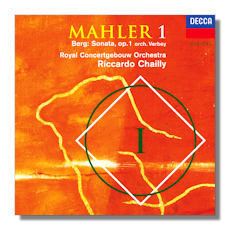
The Internet's Premier Classical Music Source
Related Links
-
Berg Reviews
Mahler Reviews - Latest Reviews
- More Reviews
-
By Composer
-
Collections
DVD & Blu-ray
Books
Concert Reviews
Articles/Interviews
Software
Audio
Search Amazon
Recommended Links
Site News
 CD Review
CD Review
Chailly Conducts Mahler

- Gustav Mahler: Symphony #1 in D Major "Titan"
- Alban Berg: Sonata, Op. 1
Royal Concertgebouw Orchestra/Riccardo Chailly
Decca 448813-2
One of the problems that faced Riccardo Chailly in recording his generally fine Mahler cycle at the Concertgebouw was performance tradition. While we writers talk a lot about a great recorded legacy over time quite frequently, there are few times in which it can be said it actually matters. But the Concertgebouw has a true history with Mahler, and some of the greatest recordings of the composer come from these forces. In the Symphony #1 alone, there are fine accounts from Haitink (his second studio version, and his live Christmas Eve set last found in Germany) and a truly great one from Leonard Bernstein that blows away his earlier Sony account. There's absolutely no question that Chailly is as intelligent a conductor as one could wish, nor is there any question of his commitment to Mahler. In fact, his outside-the-box personality and willingness to rethink his own work makes him – on paper at least – a far better fit for this music than say, Pierre Boulez. And indeed, this Mahler 1 is very good.
Of course, the playing of the Concertgebouw is unquestionably a great asset. No one picking up this disc would have any problem enjoying it from a technical standpoint. Since so many conductors try to fiddle with Mahler to make their recordings distinctive, Chailly's refusal to draw attention to himself is refreshing. The performance is emotionally cool without being outright sterile a la Boulez. The brass are extremely satisfying, and the whole orchestra sounds fabulous as a whole. The Finale is particularly invigorating, and quite harrowing in places. For me, this and the opening movement are the highlights of the disc. The inner movements are beautifully played, but the Scherzo lacks the rustic charm of Kubelik or the pure weight of Bernstein. The slow movement could also use a little more sleazy wit.
But those outer movements are pretty great, especially the final one, where the Concertgebouw brass and strings simply let go and have a great time. Anyone who wants to hear what a big name orchestra should sound like will appreciate the meticulous blend of the horns, the tangy bite of the winds, and the sheer glow of the upper violins. Everything clicks, and if listeners miss some of Lenny's devastating power and drawn out climaxes, others will appreciate this less heavy but no less personal statement. Chailly really works hard to balance his forces, and in 1996, this wasn't quite the obsession it would become later in his Brahms. Rather, he takes a picture we all have seen, and dusts it off. The Berg is orchestrated by one Theo Verbey, and proves an adventurous coupling that nobody will be buying the disc for. Still, even this is well within the history of the conductor and orchestra, both of whom championed modern music together. It's a world premiere, or was, for those unfamiliar with it. It makes an intriguing opening to a generally excellent disc.
Copyright © 2015, Brian Wigman




















